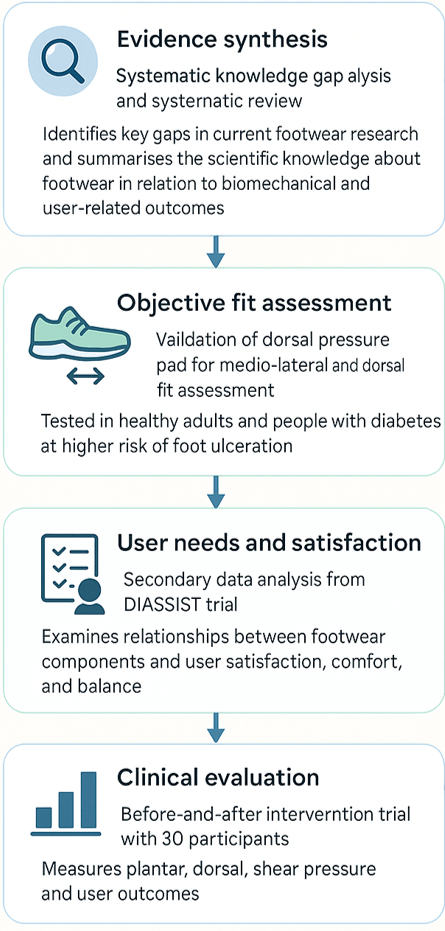Background
Diabetes-related foot ulceration is a significant global health burden, often leading to infection, hospitalisation, or amputation. Custom-made footwear plays a crucial role in preventing these ulcers, particularly in individuals at moderate to high risk of foot ulceration. However, current footwear design often prioritises biomechanical function over the real-world experiences and needs of users. A comprehensive understanding of how specific footwear components influence both biomechanical and user-related outcomes is still lacking. My project aims to address this gap by investigating both objective and subjective outcomes of custom-made footwear, ultimately supporting evidence-based, personalised, and sustainable design.
Approach
I am currently conducting a four-part research project aimed at improving the design and evaluation of custom-made footwear for individuals with diabetes who are at higher risk of foot ulceration. The project combines clinical insight, biomechanical analysis, and user-centred design.
1. Evidence synthesis (Project 1) I am finalising a systematic knowledge gap analysis and systematic review evaluating the effects of different footwear components on biomechanical and user-related outcomes in individuals at moderate to high risk of diabetes-related foot ulceration. These studies map the current evidence and identify the most critical gaps to inform future design improvements.
2. Objective fit assessment (Project 2) I am validating a novel dorsal pressure pad to objectively assess the medio-lateral and dorsal fit of footwear. The method is being tested in both healthy adults with manipulated shoe widths and in individuals with diabetes, with and without known foot fit issues. This study provides a technical foundation for improving non-plantar fit assessment in clinical settings.
3. User needs and satisfaction (Project 3) I am analysing existing DIASSIST trial data to explore how footwear component features relate to users’ reported satisfaction, comfort, and balance. I will then conduct a factor analysis to identify patterns and relationships that can guide evidence-based footwear design.
4. Clinical evaluation of optimized footwear (Project 4) I will conduct a before-and-after intervention trial in 30 people with diabetes at high risk of ulceration. Participants will receive personalised, custom-made footwear designed using the updated state-of-the-art protocol. I will compare baseline and follow-up biomechanical (e.g., plantar, dorsal, shear pressure) and user-related outcomes (e.g., comfort, fit, usability, adherence) to evaluate the added value of the new design approach.
Secondments
To deepen my expertise and strengthen translational impact, I will participate in the following secondments:
· VIBRAM & Podartis: Learn about the development and industrial manufacturing of outsoles and therapeutic footwear, including design meetings and prototype testing.
· Novel: Gain technical knowledge on pressure and shear measurement technologies, including calibration and data analysis.
· Shareborg group: Collaborate with Wittepoel on the development of personalised footwear for my final study and contribute to the next version of the state-of-the-art design protocol (2.0).
Our Research Team
I am based at the Amsterdam UMC, Department of Rehabilitation Medicine, under the guidance of Prof. Sicco Bus and Dr. Jaap van Netten. Our research centre is internationally recognised for its work on diabetic foot disease and preventive strategies, including footwear design, gait analysis, and adherence improvement. I collaborate closely with other DIALECT researchers and external partners to connect clinical, technological, and user-centred perspectives.
Amsterdam University Medical Centers
The Amsterdam UMC is the largest hospital and foremost medical research institution in the Netherlands with over 13,000 employees, combining what were previously the Academic Medical Center and Vrije Universiteit Medical Center. The location of Amsterdam UMC at Meibergdreef is part of the University of Amsterdam. Some 2500 staff members are fully or partially employed in medical research. Amsterdam Movement Sciences is one of the 8 research institutes of Amsterdam UMC that conducts world-class research on many different aspects of movement, both fundamental and clinical (see here for more info). Amsterdam UMC houses high quality core facilities including a movement analysis lab, advanced imaging techniques, medical physics department.

Doctoral Candidate
Isabella Gigante
Recruiting organisation: Recruiting organisation: Amsterdam University Medical Centers, location University of Amsterdam, Department of Rehabilitation Medicine, Meibergdreef 9, 1105AZ Amsterdam, The Netherlands.
Hosts: Prof. dr. Sicco A. Bus, dr. Jaap van Netten
Duration: 42 months
Secondments: Secondments: Vibram SpA, Milano, Italy (2 weeks); Podartis, Montebelluna, Italy (2 Weeks): Novel, Germany (1 month); Shareborg group, Amersfoort, the Netherlands (3 months)
Summary: The risk of developing a foot ulcer in people with diabetes is highest in those who have just healed from one. Many of these people are prescribed with custom-made footwear to help prevent ulcer recurrence. However, despite this treatment, ulcer recurrence incidence is high at 40% in one year. In this project, the doctoral candidate investigates how specific footwear components influence both biomechanical and user-related outcomes. Through evidence synthesis, sensor validation, secondary data analysis, and a clinical intervention study, the candidate develops and evaluates a data-driven, user-centred footwear design approach to improve effectiveness, satisfaction, and sustainability.


